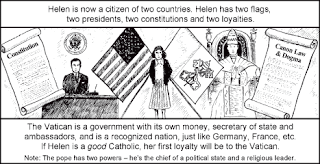OK, I'm being harsh. This book has two redeeming features. The first is that it's perhaps the only book I've ever seen where the paratext (that is, the cover, blurb and publishing details) managed to say almost nothing useful about the content.
The offending starts on the front cover, where we're improbably assured this book is a '#1 Best Seller'. This is followed with the statement in quotation marks that this is "Easily the most controversial and provocative book of the decade". We're not told the source of this quotation. Was it from William Safire? From Norman Mailer? From the parrot at the hardware store that will say anything it hears often enough?
The title of the is the biggest con of all, but we'll come to that in a minute.
The blurb declares that
Millions ... believe America is on the brink of economic collapse and moral ruin, and may lead the world into Nuclear Armageddon, attempting to hold her position of power and prestige.
Here are fascinating predictions about America, and some surprising conclusions about what the future may hold.Despite this promise, readers will be disappointed to find in the book no discussion at all about the economic policies of the later years of the Reagan administration or indeed about nuclear warfare. And this leads us to the publication details, where we're unobtrusively told that the book was originally published under the title The Great Controversy. It takes a trip to Google to discover that The Great Controversy was first published in 1858, and that it's a significant text of the Seventh Day Adventist church. Yes, readers, you've been sold a pup.
And what a pup it is: a 654-page history of Christianity (specifically, western Christianity: I don't think I saw any awareness that Orthodox or Coptic churches even exist). Heroes and villains are simple and clear, with the Protestant reformers in the former category and the Catholic church perpetually in the role of Satan's eternal co-conspirator. A warning to readers in 1858 (and presumably in 1988) declares that -
The Roman Catholic Church, with all its ramifications [sic] throughout the world, forms one vast organization, under the control, and designed to serve the interests, of the papal see. Its millions of communicants, in every country on the globe, are instructed to hold themselves as bound in allegiance to the pope. Whatever their nationality or their government, they are to regard the authority of the church as above all other. Though they may take the oath pledging their loyalty to the state, yet back of this lies the vow of obedience to Rome, absolving them of every pledge inimical to her interests (p.555)This sort of thing is the reason why Canadian police considered investigating whether distribution of this book is a hate crime. Nevertheless it points up the book's second redeeming feature. I'd always thought that Chick tracts were the crappiest form of religious publishing. I was wrong. Chick tracts are also bargain-basement anti-Catholic bigotry, but they're several several hundred pages shorter than America in Prophecy.
 |
| Chick tracts: surprisingly not the worst literature on Earth. |
America in Prophecy really can only be read as a historical text in itself. Its near-pathological hatred of the Catholic Church is an insight into the mentality of the mid-nineteenth century. The book's inexplicable reprinting in the 1980s may serve as a kind of aetiological explanation for (for example) the assertion of by 'preacher' Chuck Missler in 2016 that
There is no organisation on the planet earth that has murdered more Christians than the Roman Catholic Church. One Pope, one afternoon, murdered more Christians than all the Roman Emperors put together, and you need to understand that.Scholars from the middle ages to the present are often fond of saying "if I have seen far, it is because I stood on the shoulders of giants". Anyone relying on this book as a source of knowledge can be assured it will have more-or-less the opposite effect.
No comments:
Post a Comment